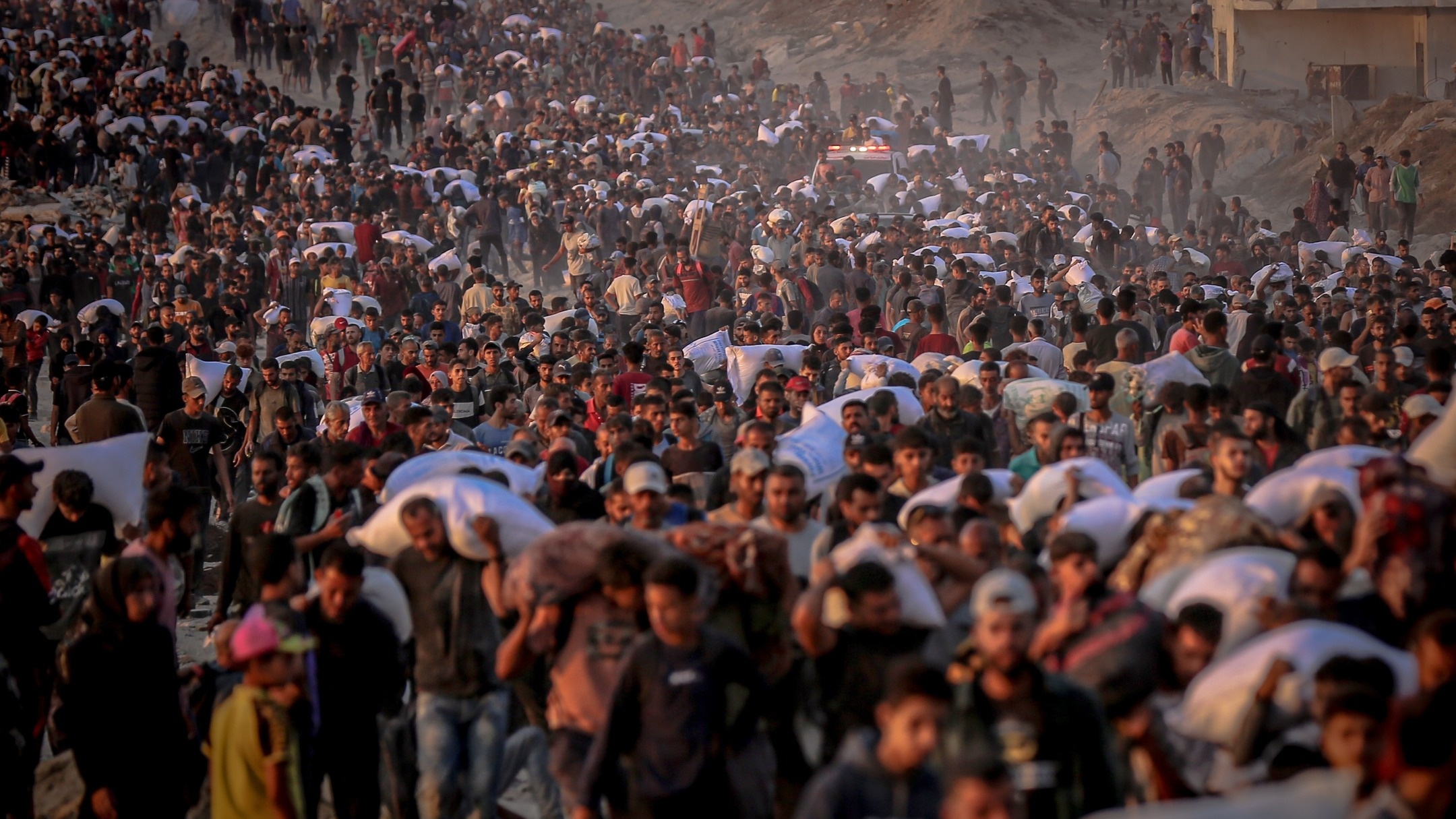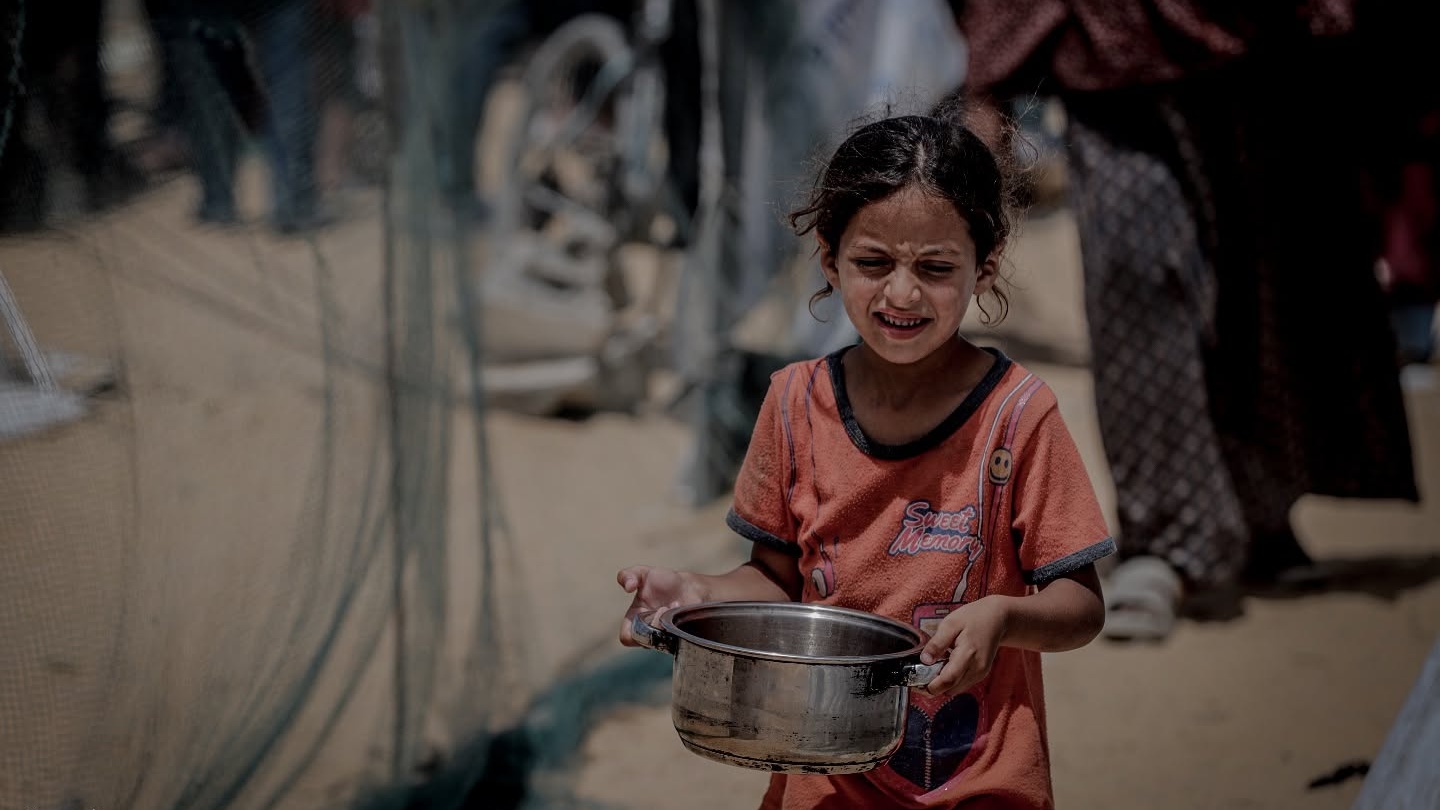The silence is breaking, but not because institutions have suddenly discovered their conscience. The shift in language comes not from moral awakening but from calculated safety: famine sounds like misfortune, genocide sounds like guilt. Famine lets them send aid without admitting harm, grieve publicly without calling out the inflictors. Genocide demands truth and accountability. Genocide threatens empire. Famine preserves it.
For two years, Palestinians pleaded for water, food and medicine — and were met with silence, with euphemisms. American media, especially The New York Times, refused to call Gaza what it was. Editors taught reporters to avoid words like “genocide” or “occupied territory” — until the violence became so extreme, the contradictions so stark, that even the most sophisticated illusions could no longer contain the truth. Now headlines stagger toward words once forbidden: starvation, famine, genocide. Britain signals recognition of Palestinian statehood, the World Health Organization declares what is unfolding a man-made mass starvation, and suddenly politicians who stayed silent as their own bombs fell are advocating for Gaza.
But this shift reveals something more sinister than delayed awakening. The rhetoric is changing not because the suffering has worsened, but because the engineers of this catastrophe have found safer ground. More Palestinians have died seeking aid since May than Israelis killed on Oct. 7, 2023. The Gaza Humanitarian Foundation, created in February 2025 and backed by U.S. and Israeli governments, has overseen distribution sites where more than 1,054 Palestinians were shot dead while seeking food. Yet now that some are willing to say famine aloud, we are told this represents progress.
The Intercept’s analysis of over 1,000 articles from major newspapers during the first six weeks after Oct. 7, 2023, reveals how deeply dehumanization operates in Western media. Humanizing language was reserved almost exclusively for Israeli suffering: “slaughter” appeared in a 60:1 ratio favoring Israeli over Palestinian deaths, “massacre” at 125:2 and “horrific” at 36:4. This was not bias. This was systematic preparation for genocide, the murder of metaphor, the assassination of analogy, the genocide of language itself.
For two years, Palestinians pleaded for water, food and medicine — and were met with silence and euphemisms. Now headlines stagger toward words once forbidden: starvation, famine, genocide. This shift reveals something more sinister than delayed awakening. The rhetoric is changing because the engineers of this catastrophe have found safer ground.
Even as starvation becomes undeniable, the machinery of denial adapts with breathtaking cynicism. When photographs of extremely thin children in Gaza began circulating, pro-Israeli voices found new ways to dismiss Palestinian suffering. The image of 18-month-old Mohammed al-Mutawaq, skeletal from malnutrition, went viral across international media. When it was revealed that the child has cerebral palsy, columnists declared the starvation narrative “a lie,” calling such images “propaganda.” One presenter suggested that Palestinian mothers, appearing “quite chubby,” should “give some of your food to your kid.”
But medical experts are clear: children with conditions like cerebral palsy require specialized nutrition and consistent healthcare. Under normal conditions, they need more calories, not fewer. Their malnourished appearance is not despite their condition but because of Israel’s deliberate denial of food and medicine. As one pediatrician explained, “You will not see children this thin or skeletal anywhere in the western or developed world, even with these kinds of conditions.” Starvation is like an iceberg, and the most visible victims are always the most vulnerable: children with illnesses, children unable to swallow, children with medical conditions. They are the first to go, followed by the wounded, then healthy children, then sick adults and, finally, healthy adults.
The New York Times, quick to fact-check and correct an image of a starving Palestinian child for having a pre-existing condition, let its “Screams Without Words” story go uncorrected for over 500 days, helping launch popular support for the genocide. When Israel’s official X account posted that “41-year-old Mohammad al-Hasanat didn’t die of starvation — he suffered from untreated diabetes,” they revealed their strategy: we didn’t starve him to death, we just made it impossible for him to get treatment until he died. This reveals the true function of their selective journalism: to manufacture doubt about Palestinian suffering while amplifying justifications for Israeli violence. Now, in 2025, as the world watches Israel commit live-streamed genocide, senior columnist Bret Stephens publishes pieces titled “No, Israel Is Not Committing Genocide in Gaza,” arguing that destroying 95% of Gaza’s agricultural land, 92% of homes and 70% of infrastructure is not “methodical” enough. He attempts to make 60,000 deaths seem “too small” for genocide, ignoring that the legal definition specifically rejects any numerical threshold.

What does it mean to “recognize Palestine” when for decades Palestinians have been systematically robbed of land, life and sovereignty? These diplomatic statements are theater designed to distract from ongoing genocide and future land theft they intend to permit. Palestine already exists. False recognition of statehood, when law has already proven meaningless in the face of genocide, accomplishes nothing. Palestinians must have full access to their land, full freedom under that land and the dignity to decide their future on their terms.
The airdropping of aid is a PR stunt when you could simply open the gates. The humanitarian theater continues while the siege tightens. At Wafa Hospital, Gaza’s neuro-rehabilitation facility, and Rantisi Hospital, the specialist pediatric unit where infants were treated, Israeli forces deliberately destroyed the infrastructure that kept the most vulnerable alive. As of this month, the entire population under five in Gaza — more than 320,000 children — are at risk of acute malnutrition, with fewer than 15% of essential nutrition treatment services functional. Netanyahu declared “no starvation in Gaza” in early July, only to have the U.N. and WHO directly contradict him: 147 hunger-related deaths reported that month, 88 children among them. Starving to death is not natural; it is administered. The engineers of hunger knew exactly what they were doing.
The true function of Western media’s selective journalism is to manufacture doubt about Palestinian suffering while amplifying justifications for Israeli violence. The narrative arc is shifting now, pushed by hunger that cannot be ignored, but moral cowardice remains: no arrests, no prosecutions, no real accountability.
Every editor who canceled stories on Palestine brought us here. The structural silence of the past two years is the real crime. Words do not feed Gaza’s children, do not rebuild hospitals, will not replace mothers who cradle bones where futures should have been. The narrative arc is shifting now, pushed by hunger that cannot be ignored, but moral cowardice remains: no arrests, no prosecutions, no real accountability.
Palestinian voices are breaking through not despite the repression, but because of our refusal to accept that some stories cannot be told, some deaths cannot be mourned, some truths cannot be spoken. Even if the media wants to distort the truth, we can cut through it: Israel is committing genocide in Gaza, the western world has supported this, corporate media has whitewashed it, and there are no excuses for it. None. Not one. Not ever.
We will never forget those who remained silent, peddling an occupying power’s right to “defend itself” while that occupation stifled the human nature in us to feel rage when we see skeletal babies. What does it feel like, as a Palestinian, to watch the world demand that our people mourn politely? To see our dead forced to debate how they died, as if the manner of their murder somehow determines their worth? To witness violence against us excused because, as Edward Said would recognize, we are seen as beasts in a man-made cage, our resistance labeled terrorism while our extermination is called self-defense.
We are told to be grateful for crumbs of recognition while our children waste away. We are asked to prove our humanity through our suffering, to perform our pain in ways that make others comfortable, to translate our liberation into the language of our oppressors. Our mothers are mocked for appearing “too healthy” while their babies starve, as if Palestinian love should manifest as shared emaciation. Our disabled children are used as evidence that we lie about our own starvation, as if cerebral palsy exempts a child from needing food.

The sound of silence, it turns out, is deafening. But it is not unbreakable. And once broken, it reveals something that no amount of propaganda can destroy: the persistent, powerful, undeniable fact that Palestinians, like all people, deserve to live with dignity, to speak their truth, and to imagine freedom without having to translate their liberation into the language of their oppressors.
They may control the headlines, but they cannot control the truth. They may manufacture consent, but they cannot manufacture our surrender. They may weaponize language, but they cannot kill the reality of our existence. Palestine is not a question waiting for their answer. Palestine is not a problem requiring their solution. Palestine is not a condition dependent on their recognition.
Palestine is what happens when a people refuse to become ghosts in their own story. Palestine is the child who draws her house with the key still in the door, the grandmother who saves seeds from a tree that no longer exists, the father who teaches his son to read a map that others have redrawn. Palestine is the memory that turns exile into return, the name that turns displacement into belonging, the love that makes occupation impossible even when it seems complete.
This is our testament: we will not disappear into their euphemisms. We will not starve quietly in their footnotes. We will not die conveniently for their narratives. We are Palestinians, and we are still here, and we will not be moved.
This essay was originally published in the newsletter State of Siege.

